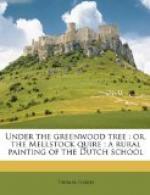Some circumstance had apparently caused much grief to Charley just previous to the entry of the choir, and he had absently taken down a small looking-glass, holding it before his face to learn how the human countenance appeared when engaged in crying, which survey led him to pause at the various points in each wail that were more than ordinarily striking, for a thorough appreciation of the general effect. Bessy was leaning against a chair, and glancing under the plaits about the waist of the plaid frock she wore, to notice the original unfaded pattern of the material as there preserved, her face bearing an expression of regret that the brightness had passed away from the visible portions. Mrs. Dewy sat in a brown settle by the side of the glowing wood fire—so glowing that with a heedful compression of the lips she would now and then rise and put her hand upon the hams and flitches of bacon lining the chimney, to reassure herself that they were not being broiled instead of smoked—a misfortune that had been known to happen now and then at Christmas-time.
“Hullo, my sonnies, here you be, then!” said Reuben Dewy at length, standing up and blowing forth a vehement gust of breath. “How the blood do puff up in anybody’s head, to be sure, a-stooping like that! I was just going out to gate to hark for ye.” He then carefully began to wind a strip of brown paper round a brass tap he held in his hand. “This in the cask here is a drop o’ the right sort” (tapping the cask); “’tis a real drop o’ cordial from the best picked apples—Sansoms, Stubbards, Five-corners, and such-like—you d’mind the sort, Michael?” (Michael nodded.) “And there’s a sprinkling of they that grow down by the orchard-rails—streaked ones—rail apples we d’call ’em, as ’tis by the rails they grow, and not knowing the right name. The water-cider from ’em is as good as most people’s best cider is.”
“Ay, and of the same make too,” said Bowman. “’It rained when we wrung it out, and the water got into it,’ folk will say. But ’tis on’y an excuse. Watered cider is too common among us.”
“Yes, yes; too common it is!” said Spinks with an inward sigh, whilst his eyes seemed to be looking at the case in an abstract form rather than at the scene before him. “Such poor liquor do make a man’s throat feel very melancholy—and is a disgrace to the name of stimmilent.”
“Come in, come in, and draw up to the fire; never mind your shoes,” said Mrs. Dewy, seeing that all except Dick had paused to wipe them upon the door-mat. “I am glad that you’ve stepped up-along at last; and, Susan, you run down to Grammer Kaytes’s and see if you can borrow some larger candles than these fourteens. Tommy Leaf, don’t ye be afeard! Come and sit here in the settle.”
This was addressed to the young man before mentioned, consisting chiefly of a human skeleton and a smock-frock, who was very awkward in his movements, apparently on account of having grown so very fast that before he had had time to get used to his height he was higher.




